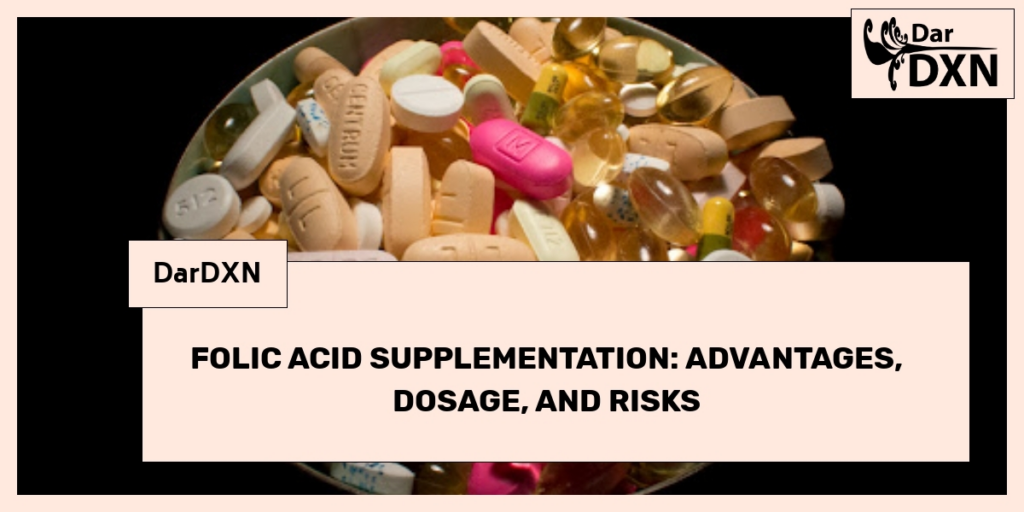Folic acid plays a crucial role in the body as a vital nutrient. It is important to be aware of the sources of folic acid and the recommended supplement dosage. Additionally, there are potential risks and interactions to consider. Various symptoms can arise from folic acid deficiency. To ensure effectiveness, it is important to select the appropriate form of folic acid supplement. Non-pregnant women, men, and children can benefit from folic acid supplements. Especially during pregnancy, all women should consider taking them. Furthermore, folic acid supplementation can help prevent childhood blindness. Managing the side effects of folic acid supplements is essential.
What is folic acid and why is it important?
Folic acid, a synthetic form of folate, is crucial for cell growth and development. It plays a vital role in DNA and red blood cell production, as well as the proper functioning of the nervous system. For women who are pregnant or planning to become pregnant, folic acid is particularly important in preventing neural tube defects in developing fetuses. It also supports overall health and wellbeing for the general population. Sources of folic acid include leafy green vegetables, citrus fruits, and fortified grains. However, some individuals may have difficulty obtaining enough folic acid through diet alone, which is why supplements are often recommended. Adequate levels of this essential nutrient can be ensured by taking a folic acid supplement, reducing the risk of associated health problems.
What are the sources of folic acid?
Folic acid, an essential B-vitamin for cell production and maintenance, can be obtained from leafy green vegetables, citrus fruits, beans, and fortified foods. During periods of rapid growth, such as pregnancy and infancy, folic acid becomes particularly important. Spinach and broccoli are rich sources of folic acid, while oranges and grapefruits also contain high levels of this vitamin. Lentils and black-eyed peas are good sources of folic acid as well. Additionally, folic acid is added to foods like bread, cereal, and pasta during processing to ensure sufficient intake. A balanced diet that includes a variety of these sources can help maintain adequate folic acid levels.
What is the recommended dosage of folic acid supplements?
The recommended daily dosage of folic acid supplements for most adults is 400 micrograms (mcg). Pregnant women should take a higher dosage of 600-800 mcg to support healthy fetal development. Higher doses may be necessary for individuals with certain health conditions or taking certain medications, as determined by their healthcare provider. Folic acid, also known as vitamin B9, is essential for cell growth and development, particularly in pregnant women to prevent neural tube defects in the fetus. It can also prevent certain types of anemia and support brain function. While some foods contain folic acid, supplements may be necessary to ensure adequate intake. It is important to consult with a healthcare professional for the appropriate dosage and to avoid any potential risks or interactions with other medications.
What are the potential risks of folic acid supplementation?
Folic acid supplementation can have potential risks. One risk is that it can mask vitamin B12 deficiency, which may cause neurological damage if not treated. Folic acid can also interact with certain medications, like anticonvulsants and methotrexate, which can reduce their effectiveness. Another risk is that high doses of folic acid may increase the risk of colorectal cancer in individuals with pre-existing colorectal adenomas. Additionally, excessive intake of folic acid can mask the symptoms of pernicious anemia, a condition caused by vitamin B12 deficiency. It is important to note that these risks are associated with high doses of folic acid supplementation and not with naturally occurring folate from food sources. Therefore, it is recommended to obtain folate from a balanced diet instead of relying solely on supplementation. If you are considering folic acid supplementation, it is advisable to consult with a healthcare professional to determine the appropriate dosage and assess any potential risks based on your individual health factors.
What are the symptoms of folic acid deficiency?
Folic acid deficiency symptoms include fatigue, weakness, pale skin, shortness of breath, irritability, and difficulty concentrating. Other possible symptoms may include heart palpitations, mouth sores, and a swollen tongue. Additionally, it can lead to more serious health problems like anemia, which causes a decrease in red blood cells and fatigue. Furthermore, it can cause neural tube defects in babies if a pregnant woman lacks folic acid. Folic acid is crucial for red blood cell production and proper neural tube development in a fetus. It is found in leafy green vegetables, citrus fruits, beans, and fortified cereals. Consult a healthcare professional if you suspect a folic acid deficiency for diagnosis and treatment.
What are the potential interactions between folic acid and other medications?
Certain medications, including methotrexate, antiepileptic drugs, and certain antibiotics, can potentially interact with folic acid. These interactions can affect the absorption, metabolism, or effectiveness of both folic acid and the other medications. For example, methotrexate, a medication used to treat cancer and autoimmune diseases, can have reduced effectiveness if folic acid supplements are taken while on it. Similarly, antiepileptic drugs like phenytoin and carbamazepine can lead to potential deficiencies in folic acid levels in the body. Some antibiotics, such as sulfonamides and trimethoprim, can reduce the effectiveness of folic acid by interfering with its metabolism. To ensure there are no potential interactions, it is important to consult with a healthcare professional before taking folic acid supplements or starting any new medications.
What are the different forms of folic acid supplements available?
Folic acid supplements are available in different forms, including tablets, capsules, and liquid formulations. Tablets, the most common form, are easy to swallow and can be taken with or without food. Capsules, another form, can be preferred by those who have difficulty swallowing tablets and can also be taken with or without food. Liquid formulations are available for individuals who struggle with swallowing tablets and capsules. These can be mixed with water or juice for easier consumption. When taking folic acid supplements, it is important to follow the recommended dosage instructions provided by the healthcare professional or product label. Folic acid is a B vitamin that is essential for red blood cell production and DNA synthesis. It is commonly used to treat or prevent folic acid deficiency, which can cause anemia and other health issues.
How can one select the appropriate folic acid supplement?
When selecting a folic acid supplement, consider your specific needs and consult with a healthcare professional. Factors to consider include age, gender, pregnancy status, and underlying health conditions. Choose a supplement that provides the recommended daily dosage of folic acid, typically 400-800 micrograms for most adults. Look for a reputable brand certified by a regulatory authority, such as the U.S. Food and Drug Administration (FDA). Check for additional ingredients in the supplement, as some individuals may have allergies or sensitivities. Read reviews and seek recommendations from trusted sources to ensure the quality and effectiveness of your chosen folic acid supplement.
What are the potential benefits of folic acid supplements for non-pregnant women?
“Folic acid supplements offer potential benefits for non-pregnant women, including improved heart health, reduced risk of certain cancers, and enhanced cognitive function. These supplements play a crucial role in the production of red blood cells and the synthesis and repair of DNA. By taking them, women can meet their daily recommended intake of this essential nutrient.
One key benefit is the positive impact on heart health. Folic acid helps lower levels of homocysteine, an amino acid that increases the risk of cardiovascular diseases like heart attacks and strokes. It also reduces the risk of certain cancers, particularly colorectal and breast cancer, by aiding in DNA repair and preventing abnormal cell growth.
Folic acid is also important for brain health and cognitive function. It supports the production of neurotransmitters, essential for proper brain function and mood regulation. Adequate folic acid intake reduces the risk of cognitive decline and age-related neurodegenerative diseases like Alzheimer’s.
In summary, folic acid supplements provide non-pregnant women with potential benefits, including improved heart health, reduced risk of certain cancers, and enhanced cognitive function.”
What are the potential benefits of folic acid supplements for men?
Folic acid supplements offer several potential benefits for men. Red blood cell production is enhanced by folic acid, preventing anemia and boosting energy levels. DNA synthesis and repair are also supported by folic acid, maintaining healthy sperm and reducing genetic abnormalities in offspring. Folic acid aids in the breakdown of homocysteine, an amino acid that can harm blood vessels, thus reducing the risk of cardiovascular diseases. Moreover, folic acid may regulate neurotransmitters in the brain, supporting cognitive function and mental health. It is important to consult with a healthcare professional before starting any new supplement regimen.
What are the potential benefits of folic acid supplements for children?
Children can benefit from folic acid supplements in several ways. Folic acid is crucial for brain and spinal cord development, promoting healthy growth. It can prevent neural tube defects like spina bifida, which can cause lifelong disabilities. Additionally, folic acid supports red blood cell production, preventing anemia. It also boosts the immune system, helping children stay healthy and fight off infections. Folic acid plays a role in DNA synthesis and repair, vital for cell division and growth. It may even improve cognitive function and mental health. However, it’s important to consult a healthcare professional before starting any supplementation regime for children.
Why should all women consider taking folic acid supplements?
Folic acid plays a crucial role in the development of a healthy baby during pregnancy. It is a B vitamin that helps form the baby’s neural tube, which develops into the brain and spinal cord. Adequate folic acid intake can significantly reduce the risk of neural tube defects, such as spina bifida, in newborns. Women of childbearing age should consume 400-800 micrograms of folic acid daily for proper neural tube development in case of an unplanned pregnancy. Taking folic acid supplements ensures sufficient levels in the body, as neural tube defects can occur early in pregnancy. Folic acid also aids in red blood cell production and prevents certain types of anemia.
When should women begin taking folic acid supplements?
To reduce the risk of neural tube defects, women should take folic acid supplements before becoming pregnant, ideally one month prior to conception. Folic acid, a crucial B vitamin for the development of the baby’s neural tube, should be taken early on in pregnancy. The Centers for Disease Control and Prevention (CDC) recommends a daily intake of 400 micrograms (mcg) of folic acid for women planning to conceive. This can be achieved through a combination of a healthy diet and folic acid supplementation. Higher doses may be necessary for some women with medical conditions or taking certain medications. Consult a healthcare provider for the appropriate dosage and timing.
What are the advantages of taking folic acid supplements?
Taking folic acid supplements can have numerous benefits for overall health. One of the most significant advantages is its role in preventing birth defects in babies, particularly neural tube defects like spina bifida. Women who are planning to conceive or are in the early stages of pregnancy should take folic acid to reduce the risk of such defects. Folic acid is also essential for the production and maintenance of new cells in the body, crucial for growth and development. It plays a key role in the production of DNA and RNA, the genetic materials of the body. Additionally, folic acid has been found to reduce the risk of certain types of cancer, such as colorectal and cervical cancer. It can also help prevent heart disease and stroke by reducing levels of homocysteine, an amino acid that can damage blood vessels. Overall, taking folic acid supplements can have numerous health benefits, particularly for pregnant women and individuals at risk of certain diseases.
Is there a relationship between B12 and folic acid supplements?
“There is a relationship between B12 and folic acid supplements. Both B12 and folic acid are essential B vitamins that play important roles in the body, including DNA synthesis, red blood cell production, and nervous system function.
In the body, B12 is necessary for the activation of folic acid, converting it into its active form, methylfolate, which is used in DNA synthesis and other biochemical reactions.
A deficiency in either B12 or folic acid can lead to similar symptoms and health issues, such as anemia, fatigue, and neurological problems. In fact, one vitamin deficiency can mask the other, so it’s important to ensure adequate levels of both.
Therefore, it is often recommended to take B12 and folic acid supplements together, especially for vegetarians, vegans, and older adults at risk of deficiencies. However, consult with a healthcare professional before starting any supplementation regimen to determine the appropriate dosage and ensure individual safety.”
Is there a link between folic acid and men’s health?
There is a link between folic acid and men’s health. Folic acid, a B vitamin, plays a crucial role in producing and maintaining new cells. It is particularly important for men’s health because it helps produce healthy sperm. Low folic acid levels have been associated with decreased sperm count and motility, leading to fertility issues. Folic acid also positively impacts cardiovascular health by reducing homocysteine levels, an amino acid linked to heart disease. It supports red blood cell production and protein metabolism, important for energy levels and muscle function. Therefore, ensuring adequate folic acid intake through diet or supplements can improve men’s overall health.
What is the importance of folic acid supplementation during pregnancy?
Folic acid supplementation is important during pregnancy for several reasons. It significantly reduces the risk of serious birth defects that affect the brain and spinal cord, known as neural tube defects. Taking folic acid before and during early pregnancy is crucial for this prevention. Folic acid also plays a crucial role in the production of red blood cells, responsible for carrying oxygen to the baby. Adequate levels of folic acid help prevent anemia in both the mother and the baby. It supports the proper development of the baby’s brain and spinal cord, as well as the growth and development of the placenta. All women planning to become pregnant or already pregnant are recommended to take a daily supplement of 400 to 800 micrograms of folic acid.
What is the role of folic acid supplementation in preventing childhood blindness?
Folic acid supplementation plays a crucial role in preventing childhood blindness, specifically congenital rubella syndrome (CRS). CRS is caused by the rubella virus, which can lead to severe birth defects, including blindness. By reducing the risk of rubella infection during pregnancy, folic acid supplementation helps prevent CRS. Rubella is highly contagious and can be transmitted from an infected mother to her unborn child. Adequate levels of folic acid in pregnant women significantly reduce the risk of rubella infection and subsequent blindness in the child. Folic acid, a B vitamin, is essential for proper fetal development, including the formation of the neural tube, which becomes the brain and spinal cord. Therefore, folic acid supplementation not only prevents CRS but also reduces the risk of other neural tube defects that can cause blindness or other disabilities in children.
How can the side effects of folic acid supplements be managed?
To manage the side effects of folic acid supplements, adjust the dosage, take them with food, or switch to methylfolate. Folic acid is essential for cell growth and development, but it may cause nausea, bloating, and abdominal cramps. Start with a lower dosage and gradually increase it. Taking the supplements with food can reduce gastrointestinal discomfort. If the side effects persist or become severe, switch to methylfolate, which is better absorbed by the body. Always consult with a healthcare professional before changing supplement intake.
What is the contextual flow happening with anchor segments?
“Anchor segments are essential for establishing a coherent and cohesive flow of information within a larger text. They serve as points of reference that help readers understand the relationships between ideas, arguments, or events. In terms of their contextual flow, anchor segments can introduce new topics, provide summaries, offer examples, or indicate contrasts. By using anchor segments effectively, writers can guide readers through their text logically and coherently.
To achieve a smooth contextual flow, writers should consider the overall structure and organization of their text. They should use appropriate transition words or phrases, such as “”however”” or “”on the other hand,”” to signal connections. Additionally, writers should ensure that the anchor segments are logically arranged and that the information flows naturally.
In summary, anchor segments play a crucial role in establishing connections and transitions between different parts of a text. They enhance readers’ understanding of the relationships between ideas or arguments, ensuring coherence and cohesion.”







